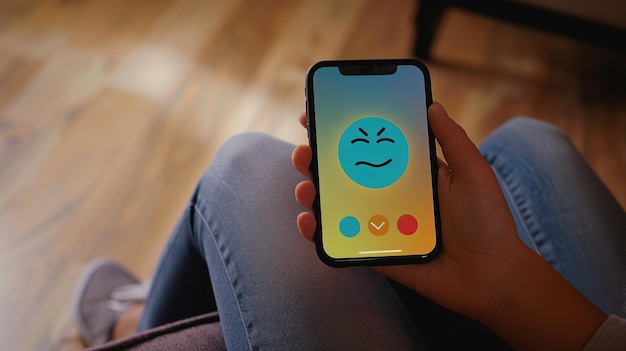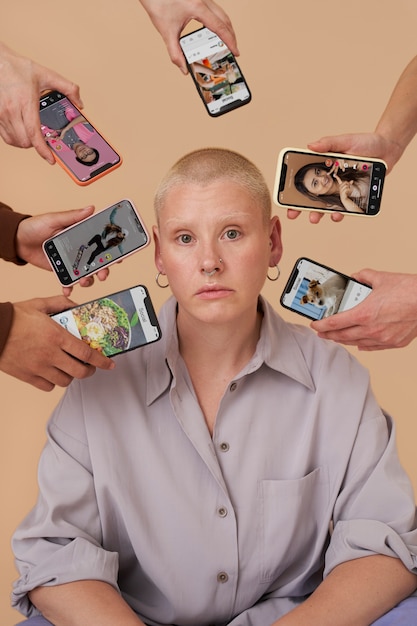Mental Health Apps in 2025: Effectiveness and Privacy Concerns

In 2025, mental health apps offer accessible support, yet concerns regarding data privacy and the effectiveness of these tools remain critical considerations for users.
Are mental health apps truly effective, and what are the latest privacy concerns surrounding them in 2025? With the increasing reliance on technology for well-being, understanding the benefits and risks of these apps is more critical than ever.
Are Mental Health Apps Effective?
The digital landscape has transformed mental healthcare, making it more accessible and convenient. But do these apps deliver on their promise? Let’s delve into the effectiveness of mental health apps, examining their benefits and limitations.
Mental health apps offer a range of features from mood tracking to guided meditations. While they can be a valuable tool, their effectiveness depends on several factors. Factors such as the app’s credibility, the user’s commitment, and the specific mental health need play a role.
Benefits of Mental Health Apps
Mental health apps offer several potential benefits, making them an attractive option for individuals looking for support. One significant advantage is accessibility, allowing users to seek help from anywhere at any time.
Limitations of Mental Health Apps
Despite their advantages, mental health apps have limitations that should be considered. One major concern is the lack of personalized care, as apps may not be able to address the unique needs of each individual.
- Accessibility: Offer 24/7 support from anywhere, making mental health resources more readily available.
- Affordability: Often more cost-effective than traditional therapy, reducing financial barriers to care.
- Convenience: Integrate easily into daily routines, allowing users to engage with mental health tools at their own pace.

In conclusion, mental health apps can be an effective tool for many, providing convenient and accessible support. However, users should be aware of their limitations and choose apps that align with their specific needs and preferences.
Privacy Concerns Surrounding Mental Health Apps in 2025
As mental health apps become more integrated into our lives, it’s crucial to address the privacy concerns they raise. Understanding how these apps handle your data is essential to protecting your sensitive information. In 2025, these concerns are more relevant than ever.
The data collected by mental health apps can include personal information, mood patterns, and therapy session content. The privacy of this data is crucial, as breaches or misuse could have serious consequences. Security becomes even more critical as time progresses.
Data Collection Practices
Many mental health apps collect a variety of data, including personal information, usage patterns, and even biometric data. Knowing what data is being collected and how it’s being used is a crucial step in protecting your privacy.
Data Security Measures
Mental health apps should implement robust security measures to protect user data from unauthorized access and breaches. Encryption, data anonymization, and regular security audits are essential components of a secure app.
- Data Encryption: Ensures that sensitive data is protected during transmission and storage, preventing unauthorized access.
- Privacy Policies: Transparently outline data collection and usage practices, giving users control over their information.
- Regular Updates: Address security vulnerabilities and improve overall data protection.
Ultimately, privacy concerns are a significant aspect when using mental health apps. Users should be proactive in understanding and managing their data to safeguard their well-being effectively.
Benefits and Risks of Using Mental Health Apps
Mental health apps present an array of benefits and risks, making it essential to weigh both sides before adopting them. Understanding these aspects will help you make an informed decision that supports your mental well-being effectively.
While mental health apps offer convenience and accessibility, it’s essential to be aware of their potential drawbacks. Balancing the advantages with the risks ensures a well-rounded approach to leveraging these tools for mental health support.

Potential Benefits
The benefits of mental health apps include improved accessibility and convenience, as well as the ability to track and manage mental health symptoms. Additionally, some apps offer tools that complement traditional therapy.
Potential Risks
The risks of using mental health apps include privacy concerns, lack of personalized care, and the potential for inaccurate or misleading information. These factors can impact the effectiveness and safety of the app.
To summarise, carefully evaluating the benefits and risks of mental health apps is vital. It’s important to ensure that your chosen app aligns with your personal needs and priorities. This approach helps you make the most of the app’s potential while mitigating potential problems.
The Role of AI in Mental Health Apps
Artificial intelligence is revolutionizing mental health apps, enhancing their capabilities and personalization. Understanding the role of AI and its impact is crucial for navigating the evolving landscape of digital mental health.
AI-powered features in mental health apps range from personalized recommendations to chatbots that provide real-time support. These advancements offer new opportunities for mental health intervention and care.
AI-Powered Features
AI-driven features include personalized therapy plans, real-time mood analysis, and predictive analytics for identifying potential mental health crises. These tools aim to improve the effectiveness and efficiency of mental health apps.
Ethical Considerations
While AI offers many advantages, it also raises ethical considerations related to data privacy, algorithmic bias, and the potential for over-reliance on technology. Addressing these concerns is essential for responsible AI implementation.
- Personalized Recommendations: Tailored content and resources based on user data, enhancing engagement and effectiveness.
- Chatbots: Provide immediate support and guidance, offering a sense of connection and assistance.
- Data Analysis: Identify patterns and trends in user behavior, helping to predict and prevent mental health crises.
In summary, AI plays a transformative role in mental health apps, offering both enhanced capabilities and ethical challenges. Understanding these aspects ensures the responsible and effective use of AI in digital mental healthcare.
How to Choose a Safe and Effective Mental Health App in 2025
Selecting a mental health app requires careful consideration to ensure safety and effectiveness. By following a few guidelines, you can make an informed decision that supports your mental well-being.
With numerous mental health apps available, it’s essential to differentiate between credible and unreliable options. Choosing an app backed by evidence-based practices and robust privacy measures is crucial.
Research and Reviews
Begin by researching the app’s credibility, reading user reviews, and checking for endorsements from mental health organizations. This provides insight into the app’s effectiveness and user satisfaction.
Privacy and Security Measures
Prioritize apps with strong privacy and security measures, including data encryption, transparent privacy policies, and compliance with relevant regulations. Protecting your personal information should be a top priority.
- Check for Credentials: Ensure the app is developed or endorsed by licensed mental health professionals.
- Read Privacy Policies: Understand how your data is collected, used, and protected.
- Look for Evidence-Based Practices: Choose apps that utilize techniques supported by scientific research.
To conclude, a thoughtful approach to choosing a mental health app is essential for ensuring a safe and effective experience. By conducting thorough research and prioritizing privacy and security, you can find an app that truly supports your mental health goals.
The Future of Mental Health Apps
The future of mental health apps is poised for significant advancements, driven by technological innovations and evolving user needs. Keeping an eye on these trends is crucial to harness the full potential of digital mental healthcare.
As technology continues to advance, mental health apps are expected to become more personalized, integrated, and effective. These developments promise to transform the landscape of mental healthcare.
Emerging Technologies
Emerging technologies such as virtual reality (VR), augmented reality (AR), and wearable sensors are set to enhance the capabilities of mental health apps. These tools offer new ways to engage users and provide more immersive and personalized experiences.
Integration with Traditional Therapy
The integration of mental health apps with traditional therapy is expected to increase, creating a hybrid approach that combines the benefits of both digital and in-person care. This collaborative model can improve treatment outcomes and accessibility.
In closing, the future of mental health apps holds immense potential for revolutionizing mental healthcare. Staying informed about emerging trends and integrating these technologies responsibly will be key to improving mental well-being on a global scale.
| Key Point | Brief Description |
|---|---|
| 📱 Accessibility | Offers 24/7 support from anywhere, increasing mental health resource availability. |
| 🔒 Privacy Concerns | Understanding data collection practices and security measures is essential for user protection. |
| 🤖 AI Integration | AI enhances personalization and offers real-time support, but ethical considerations are crucial. |
| 🛡️ Secure Choices | Researching app credibility and security features ensures a safe and effective mental health experience. |
Frequently Asked Questions
▼
Yes, many studies show that mental health apps can be effective. They provide accessible tools for managing symptoms, tracking mood, and promoting overall well-being when used consistently.
▼
Privacy concerns include the collection and potential misuse of personal data, such as mood patterns and therapy session content. It’s vital to choose apps with robust security measures.
▼
AI enhances apps through personalized recommendations, real-time mood analysis, and predictive analytics, all contributing to more effective and tailored mental health support.
▼
Look for apps with licensed mental health professionals, transparent privacy policies, and evidence-based practices. Reading reviews helps assess effectiveness and user satisfaction.
▼
Future trends include integrating VR, AR, and wearable sensors for immersive experiences, along with combining apps with traditional therapy for a more holistic care approach.
Conclusion
In conclusion, mental health apps in 2025 offer both significant benefits and potential risks. By staying informed about privacy concerns, understanding the role of AI, and carefully choosing apps, individuals can leverage these tools to support their mental well-being effectively. Prioritizing credible, secure, and evidence-based options ensures a positive and safe experience in the evolving landscape of digital mental healthcare.
